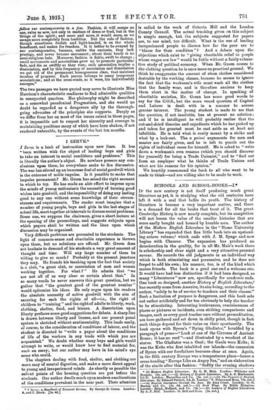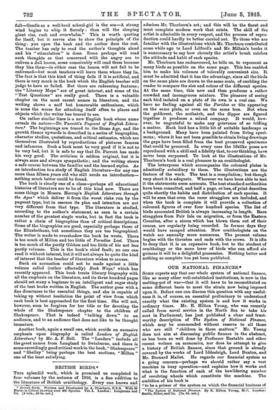SCHOOLS AND SCHOOL-BOOKS.—I.°
IF the new century is not itself producing much great literature as yet, it is studying what the old centuries have left it with a zeal that befits its youth. The history of literature is become a very important matter, and there is a demand for all the books that treat of it. The great Cambridge History is now nearly complete, but its completion will not lessen the value of the smaller histories that are more easily bought and housed by humble men. The author of the Modern English Literature in the "Moose University Library" has expanded that fine little book into an upstand- ing octavo volume; which ends with J. M. Synge and now begins with Chaucer. The expansion has produced no deterioration in the quality, for in all Mr. Hair's work there is scholarship and clear sight and a very attractive personal savour. He records the old judgments in an individual way which is both stimulating and persuasive, and he does not forget to add his own ; his manner, too, is of the kind which makes friends. The book is a good one and a welcome one. It would have had leas distinction if it had been designed, as many "Literatures " now are, specifically for academic ends. One book so designed, another History of English Literature,. has recently come from America, its aim being, according to the author, "solely to be of service to teachers and their classes." Seel, a limitation of purpose is dangerous, and this book sets out rather artificially and far too obviously to help the teacher to be 'stimulating. Interesting irrelevances, reminiscences of places or pictures or incidents, even striking comparisons and images, such as every good teacher uses without premeditation, are here gathered and set down in chilly print, though in fact such things depend for their value on their spontaneity. The book opens with Byron's "Dying Gladiator," heralded by a paragraph of prose—" Look at one of the Circuses of Ancient Rome ; it has no roof "—and illustrated by a woodcut of the statue. The Gladiator was a Gaul ; the Gauls were Melts; it was the Melts who first inhabited our islands—the connexion of Byron with our forefathers becomes clear at once. Again, in the fifth century Europe was a tempestuous place—hence a cross-heading" Europe Like an Angry Sea," and an elaboration of the simile after this fashion : "Softly the evening shadows • (I) jggageet Hagtiek Literature. By G. H. Hair. London Williams and Norgate. (Os. et.)—(2) History of Saglish Literature. By A. 8. Mackenzie. Lit.D. London Macmillan and Co. [5a. net.]--(3) The Pageant of English .Letaratara By Edward Parrott, LL.D, Loudon T. Nelsonand 80110. tea. net.] —(1) Bagtielt Literature Greugh the Ages. By Any Cruse. London G. Harrap and Co. Pe. 6d. net.]—(5) Book Way,. By Edith Klmpton. London • Haigh, HoMmi, and Co. rsai—ea Leaden of Emilia Literature. By A. F. Bell. LOndon G. Ball and Sons. [Is. not.]
fall—Gentle as a well-bred school-girl is the sea—A, strong wind begins to whip it fiercely: then will the sleeping giant rise, rush and overwhelm." This is worth quoting for itself, but it serves also to show the principle of the thing you open the book and the author does the rest. The teacher has only to read the author's thoughts aloud and his" stimulation" is done. Some perhaps will read such thoughts as that concerned with the angry sea to enliven a dull lesson, some conceivably will read them because they like them—in either case the lesson will not fail to be enlivened—but most teachers will leave them where they lie. The fact is that this kind of thing fails if it is artificial, and there is very much in the book which the English teacher will judge to have so failed. But there are redeeming features ; the "Literary Maps" are of great interest, and some of the "Test Questions" are really good. There is a valuable chapter on the most recent names in literature, and the writing shows a nalf but honourable enthusiasm, which is none the worse for attaching itself often to places and objects which the writer has toured to see.
On rather similar lines is a new English book whose name reveals its nature—Dr. Parrott's Pageant of English Litera- ture., The beginnings are traced to the Stone Age, and the growth thence upwards is described in a series of biographies, character studies, quotations, and critical estimates, which are themselves illustrated by reproductions of pictures famous and infamous. Such a book must be very good if it is not to be very bad, but it is safe to say that Dr. Parrott has made his very good. The criticism is seldom original, but it is always sane and always sympathetic ; and the writing steers a safe course between the familiar and the learned styles. As an introduction to a study of English literature—for any one more than fifteen years old who still needs an introduction— nothing much better could be found.
The book is clearly one of a class—perhaps all educational histories of literature are to be of this kind now. There are some things in Messrs. Harrap's English literature through the Ages' which deliver it from the worst risks run by the pageant type, but in essence its plan and intention are not very different from that type. The literature is studied, according to the author's statement, as seen in a certain number of the greatest single works, but in fact the book is rather a chain of biographies than of critical descriptions. Some of the biographies are good, especially perhaps those of the Elizabethans, but sometimes they are too biographical. The writer is made to overshadow the book he wrote. There is too much of Milton and too little of Paradise Lost. There is too much of the portly Gibbon and too little of his not less portly volumes. This is the book's chief fault; no one can read it without interest, but it will not always be quite the kind of interest that the teacher of literature wishes to arouse.
Such an accusation could not be made against a little volume called (rather affectedly) Book Ways,' which has recently appeared. This book treats literary biography with all the emphasis on the literature, and its three hundred pages should set many a beginner to an intelligent and eager study of the best books written in English. The author goes with a fine directness to the essential things, and she is capable of taking up without hesitation the point of view from which each book is best approached for the first time. She will not, however, soon be forgiven for her title or for devoting the whole of the Shakespeare chapter to the children of Shakespeare. That is indeed "talking down" to an audience, and to an audience that does not like to be thought immature.
Another book, again a small one, which avoids an excessive emphasis upon biography is called Leaders of English Literature,' by Mr. A. F. Bell. The "Leaders" include all the great names from Langland to Swinburne, and there is some exceedingly good critical work in the book, " Shakespeare " and " Shelley " being perhaps the best sections, "Milton" one of the least satisfying.



































 Previous page
Previous page